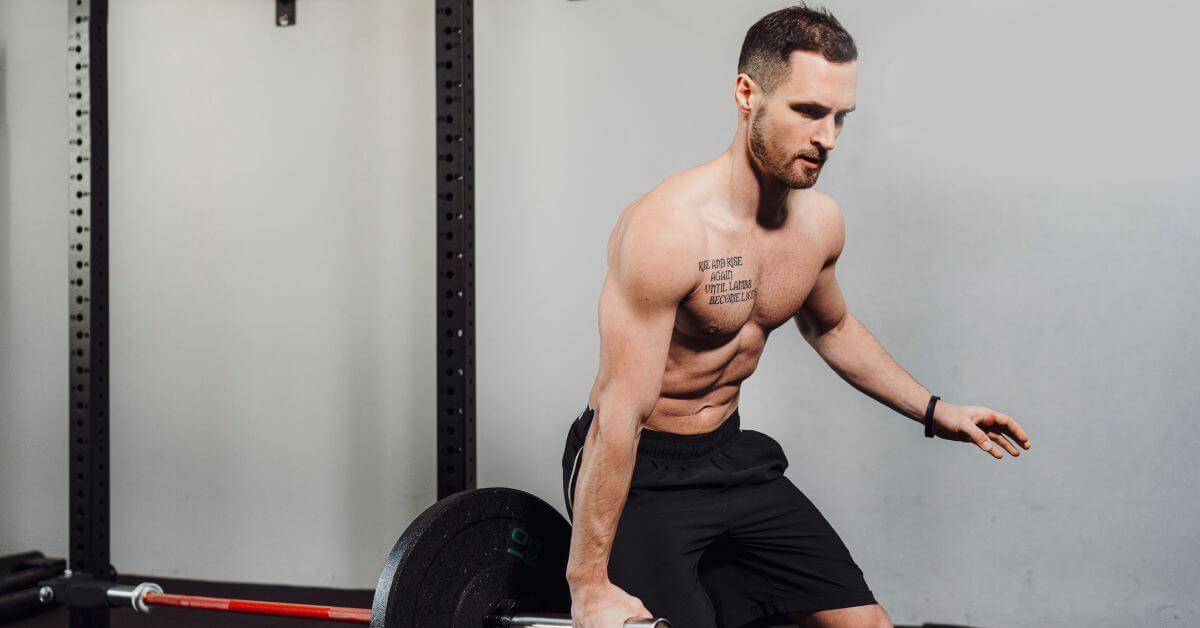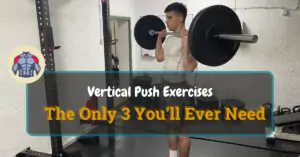Functional upper body exercises are using motions that replicate daily tasks and target the muscles in your upper body, including your chest, back, shoulders, and arms.
Table of Contents
ToggleIncorporating upper body functional exercises into your training program is a wonderful place to start if you want to increase your upper body strength, stability, and general fitness.
These activities target several different muscle groups, which makes them more useful and efficient for enhancing daily tasks and performance. Functional strength training examples include movements like the kneeling kettlebell press and inverted TRX row.
In this post, we’ll examine some of the top upper body functional training exercises you may include in your training program and the advantages they provide for your fitness and health objectives.
Now let’s dig in and learn how these exercises may assist you to advance your upper body fitness!
Our Recommended Functional Upper Body Equipment
Amazon Basics Hex Dumbbell
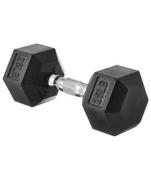
- Durable cast iron
- Non-slip grip
- Available in multiple sizes
Start Building Your Dream Body Today
Ready to elevate your fitness game without falling into the trap of dull, repetitive routines that just don’t deliver? Imagine sculpting your ideal physique and boosting your health, all while still enjoying life’s pleasures, like those irresistible weekend getaways and your aunt’s legendary cheesecake. With our online fitness and nutrition coaching service, you don’t have to compromise. Dive into a personalized fitness journey that blends perfectly with your lifestyle, not against it. Book your completely free discovery consultation today, and take the first step towards a transformation that doesn’t require giving up the joys of life.

“I was skeptical about online fitness coaching, but Functional Body Savage completely changed my perspective. Vanja and Radomir’s personalized approach and attention to detail have helped me achieve goals I never thought possible. I’m stronger, more confident, and grateful for their guidance.”
Emily Thompson, San Francisco, CA
Learn More About Our Online Coaching ServiceQuick Summary
- Exercises for upper body functional strength training target various muscle groups and movement patterns.
- When coupled with a good diet and enough rest, functional exercise can help you increase your body composition and build lean muscle.
- Functional training upper body workouts can enhance everyday tasks and athletic performance.
- The best equipment for developing functional upper body strength includes kettlebells, resistance bands, TRX straps, dumbbells, and bodyweight movements.
- Building functional upper-body strength requires consistency and advancement.
10 Functional Upper Body Exercises for Functional Upper Body Workout
We’ll go over 10 functional upper body exercises you can use for the best outcomes in your fitness regimen.
These exercises are intended to target several muscles at once, enhancing your upper body’s general strength, stability, and coordination.
They will advance your routine regardless of whether you’re an athlete, a fitness enthusiast, or just trying to enhance your general health and wellness. Integrating functional exercises for upper body can significantly improve your overall fitness [1].
1. Kneeling Kettlebell Press
The kneeling kettlebell press is a strenuous exercise that uses the vertical pushing movement pattern.
It targets your shoulders, chest, and triceps, among other upper body muscles, and utilizes kettlebells as equipment.
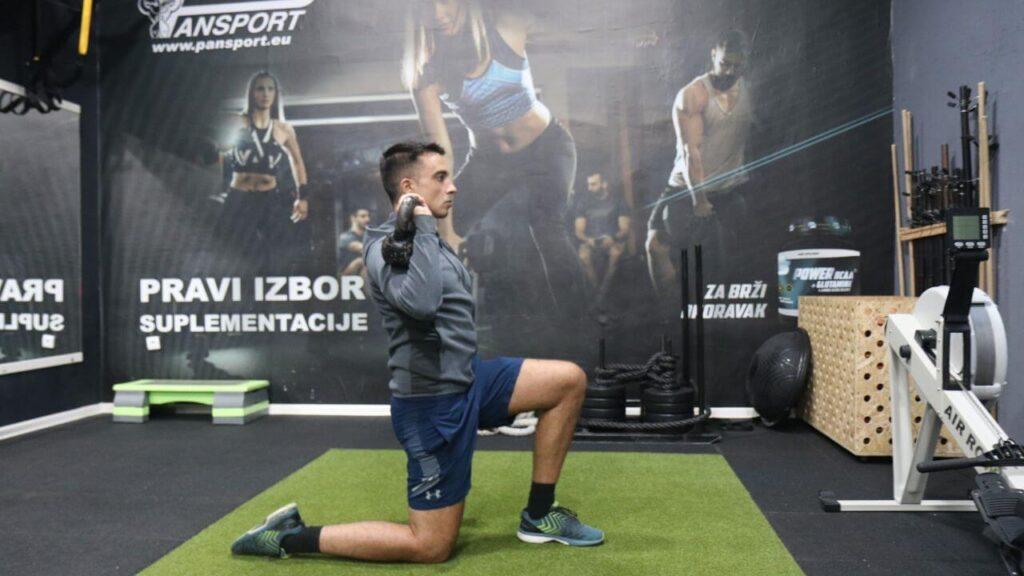
How to Perform a Kneeling Kettlebell Press
- With your knees hip-width apart and your toes tucked under, begin by kneeling on the ground.
- Utilizing an overhand grip, lift the kettlebell to shoulder height while holding it in one hand. Face your hand away from your body so that the palm is facing outside.
- Press the kettlebell above, completely extending your arm, while maintaining a tight core and a straight back. All during the exercise, be careful to have good form and control.
- Repeat the motion for the required number of repetitions before lowering the kettlebell gradually back to the starting position.
2. Negative Push-up
The negative push-up is a powerful bodyweight exercise that belongs to the horizontal push movement pattern and targets the chest, shoulders, and triceps among other upper body muscles. It is one of the best functional strength exercises you can include in your routine.
This push-up variation employs no equipment and concentrates on the eccentric (lowering) part of the exercise.
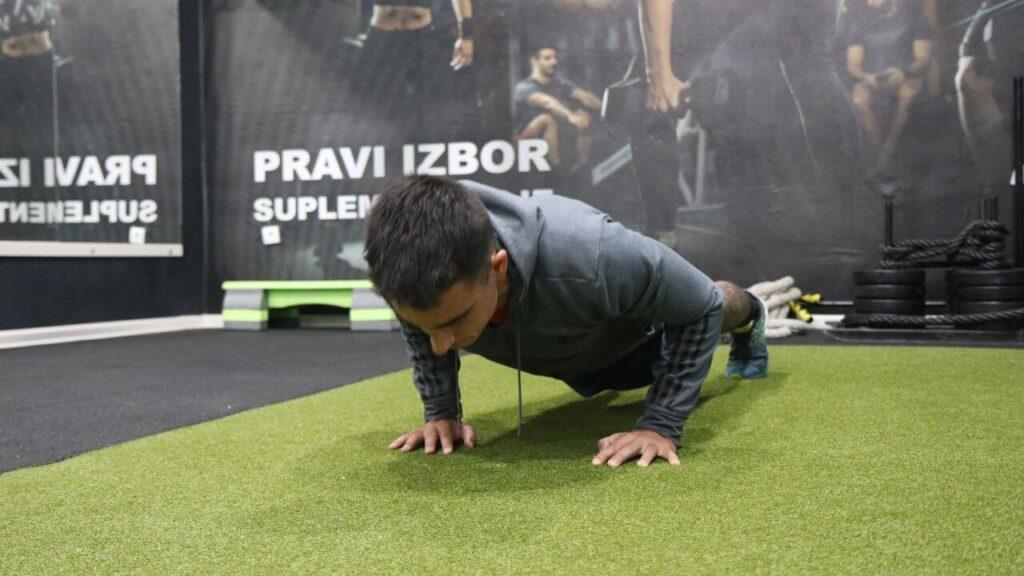
How to Perform a Negative Push-up
- With your feet hip-width apart and your hands somewhat wider than shoulder-width apart, start off in a high plank position.
- Maintaining your elbows tight to your sides and your abs engaged, slowly lower your body to the ground.
- The optimal time to reach the bottom of the action is 3-5 seconds. Lower yourself as gently and with as much control as you can.
- Kneel down after you’ve reached the bottom of the action, then push yourself back up to the starting position while continuing to repeat for the required amount of repetitions.
3. Inverted TRX Row
The inverted TRX row falls under a horizontal pull movement pattern and works your back, shoulders, biceps, and other upper body muscles.
It involves the use of a TRX suspension trainer, a piece of equipment that is common in gyms.
It’s critical to maintain appropriate form and control throughout this exercise.
Avoid sagging hips or an arched back since these postures might place too much strain on your lower back.
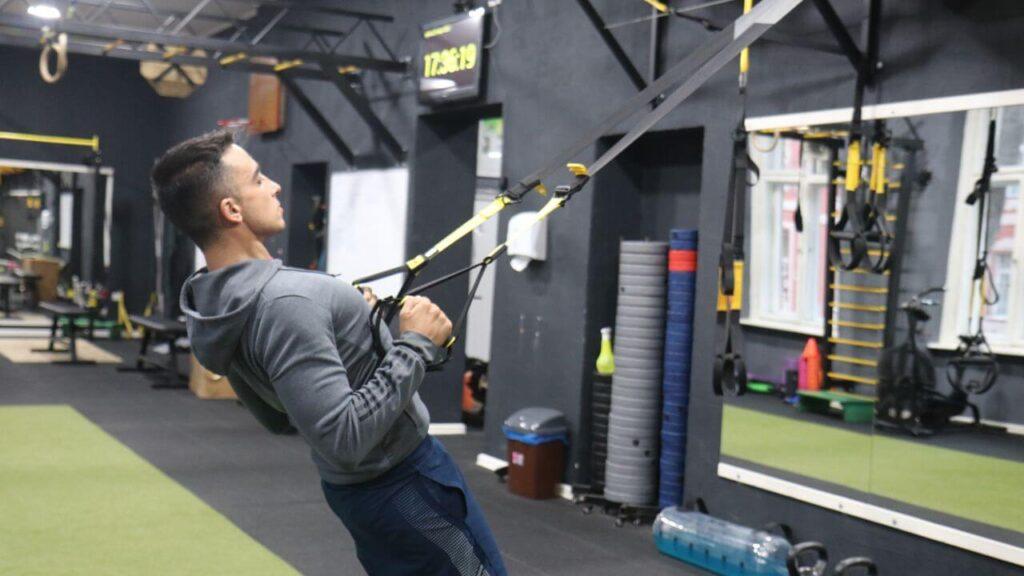
How to Perform Inverted TRX Row
- Start by adjusting the TRX straps so that you can do the exercise with perfect form.
- Walk your feet forward until your torso is at a 45-degree angle to the ground, at which point you should grab the TRX handles with an overhand hold.
- Pull your body toward the TRX handles, pushing your chest nearer your hands while maintaining a squeezed core and a straight back.
- Repeat the movement until you have completed the appropriate number of repetitions, then lower your body back down to the starting position.
4. Negative Pull-up
The negative pull-up is a bodyweight exercise that focuses on your upper back, shoulders, forearms, and biceps and belongs to the vertical pull movement pattern.
It is an eccentric pull-up variant that may be performed without any additional equipment.
To make the exercise more difficult, increase the length of time it takes to lower yourself or add weight to your body. You can also try a variation called neutral grip pull-up if you find negative variation too easy already.
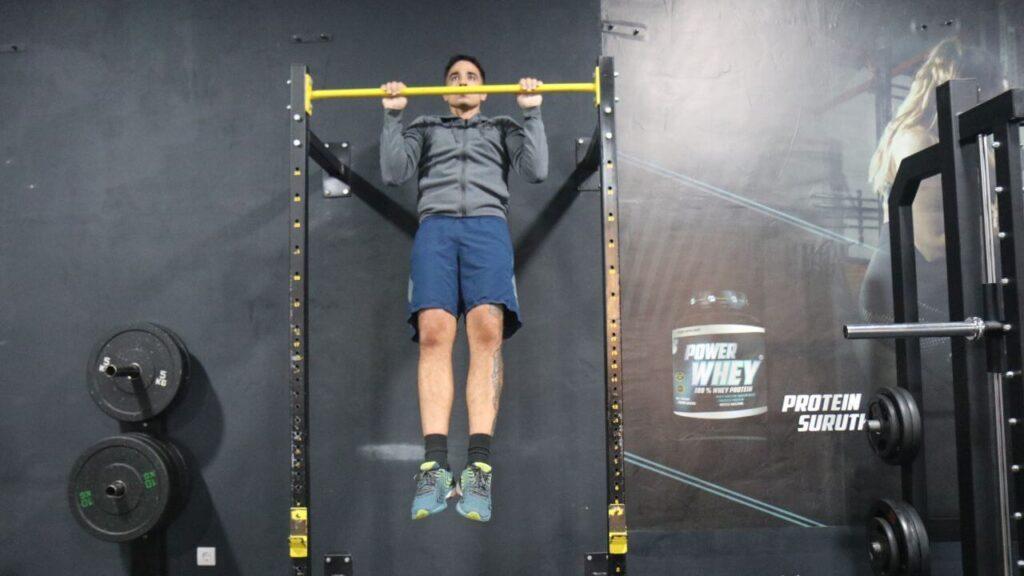
How to Perform a Negative Pull-up
- Reach the top of a pull-up bar by standing on a stable platform. Put your hands slightly wider than shoulder-width apart and take an overhand hold on the bar.
- Your chin should be above the bar after you jump or step up.
- Spend around 3-5 seconds lowering your body as far as you can go before touching the ground.
- Release your hold on the bar after you’ve reached the bottom of the exercise, then rise back up to the beginning position.
Our Recommended Functional Upper Body Equipment
Amazon Basics Hex Dumbbell

- Durable cast iron
- Non-slip grip
- Available in multiple sizes
5. Single Arm Dumbbell Row
The single-arm dumbbell row is an excellent exercise for developing the size and strength of your back muscles, particularly the lats, rhomboids, and rear delts.
You may read our guide on dumbbell rows muscles worked for a more comprehensive analysis regarding primary and secondary muscles.
It falls within the horizontal pull movement pattern and calls for a dumbbell as equipment.
Maintaining appropriate form and control during a single-arm dumbbell row is crucial.
Pay special attention to squeezing your shoulder blades together to engage your upper back muscles.
Read our comprehensive guide to learn how to do dumbbell rows correctly.
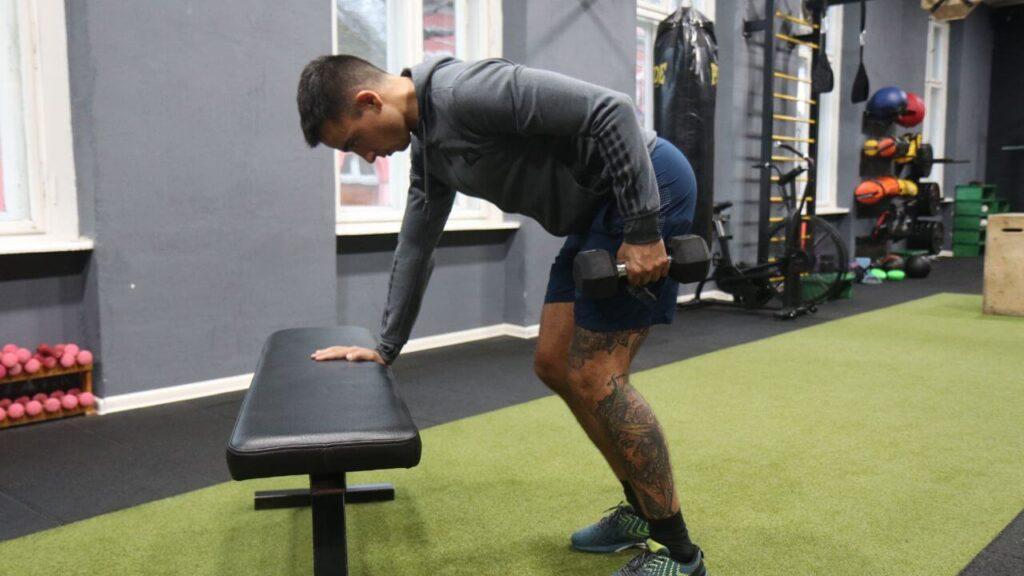
How to Perform Single Arm Dumbbell Row
- Start by standing close to the bench and placing your left knee and hand on it. You should have your left hand precisely beneath your left shoulder and your back parallel to the floor.
- Pick up the dumbbell with your right hand and stretch your arm toward the ground.
- Pull the dumbbell towards your body while keeping your back straight and your core engaged, bending your elbow and pressing your shoulder blades together.
- Lower the dumbbell to its starting position and repeat for the appropriate amount of reps before switching sides.
6. Battle Ropes
Battle ropes are a fantastic functional upper body workout that primarily works your shoulders, arms, and core muscles. It is a part of the vertical pull and push movement patterns.
It may be changed to stimulate different muscle groups and test your coordination and balance by executing a range of actions, such as smashes, circles, and side-to-side waves.
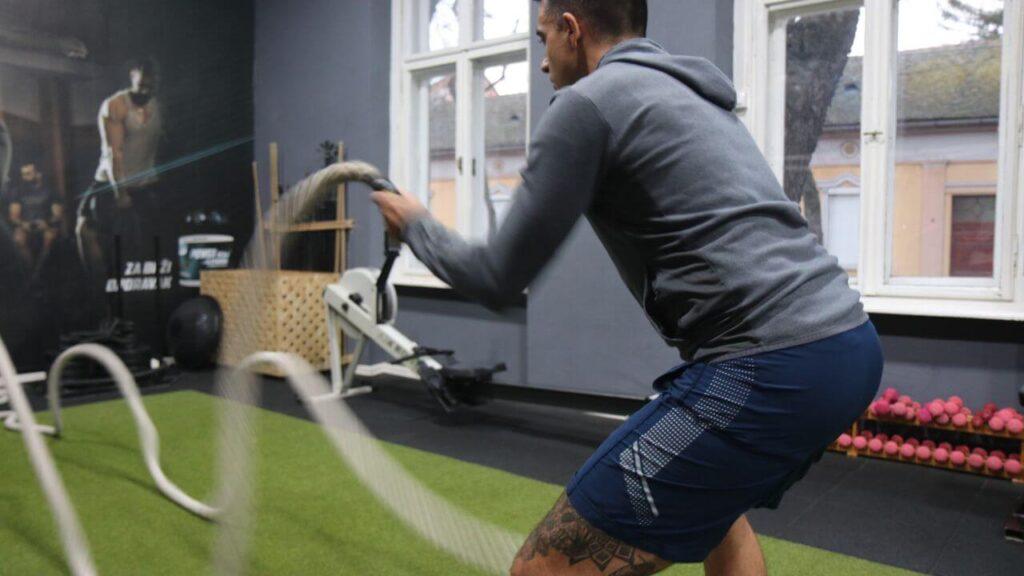
How to Perform Battle Ropes
- Start by standing facing the secured ropes with your feet shoulder-width apart.
- With your palms facing inward and your arms outstretched in front of you, grasp one rope in each hand.
- Start off by raising and lowering both ropes simultaneously to form a wave-like action.
- As you grow more adept at the technique, you can begin to introduce modifications, such as switching which rope you move or arranging the ropes in a figure-eight pattern.
7. Tyre Flip
The tyre flip is a powerful full-body exercise that works the muscles in the legs, hips and upper body as a whole.
You will need a huge tire, such as those found at construction sites or junkyards, to do this exercise, which is part of the horizontal pushing and pulling movement patterns.
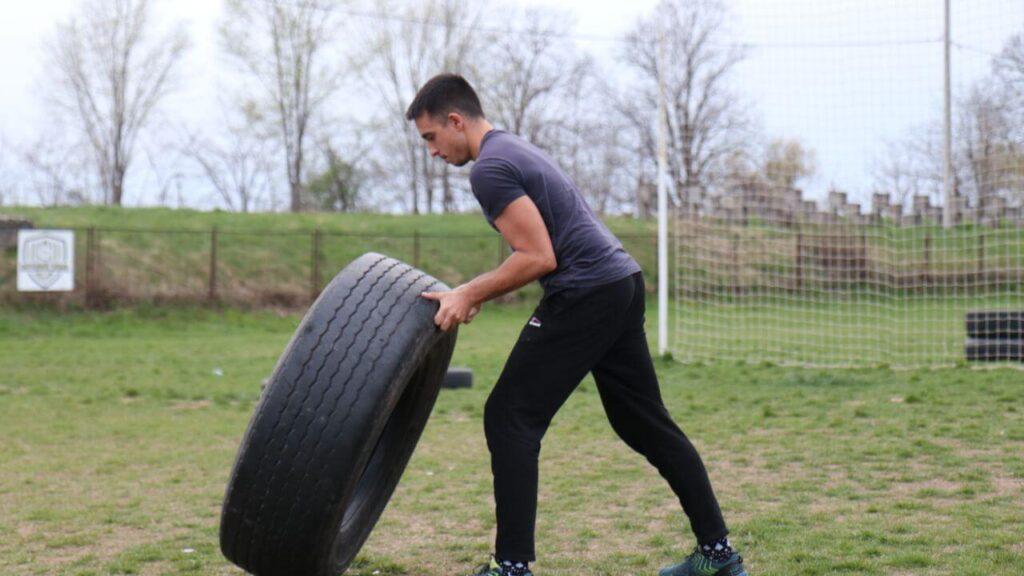
How to Perform a Tyre Flip
- Standing behind the tire, with your feet shoulder-width apart and your hands on the bottom edge of the tire, is a good place to start.
- While maintaining your back straight and your core active, squat down and hold the tire with both hands.
- With your legs, hips, and core working together, forcefully pull the tire off the ground.
- Flip the tire over in a single, fluid motion when it has left the ground, propelling it forward with your legs and hips.
8. Ball Slam
The ball slam is a dynamic exercise that works the upper body, core, and leg muscles. It is one of the examples of functional strength training that enhances power and coordination.
This exercise is part of the vertical pushing movement pattern and requires the use of a medicine ball.
The weight of the ball can vary, depending on your level of strength and fitness.
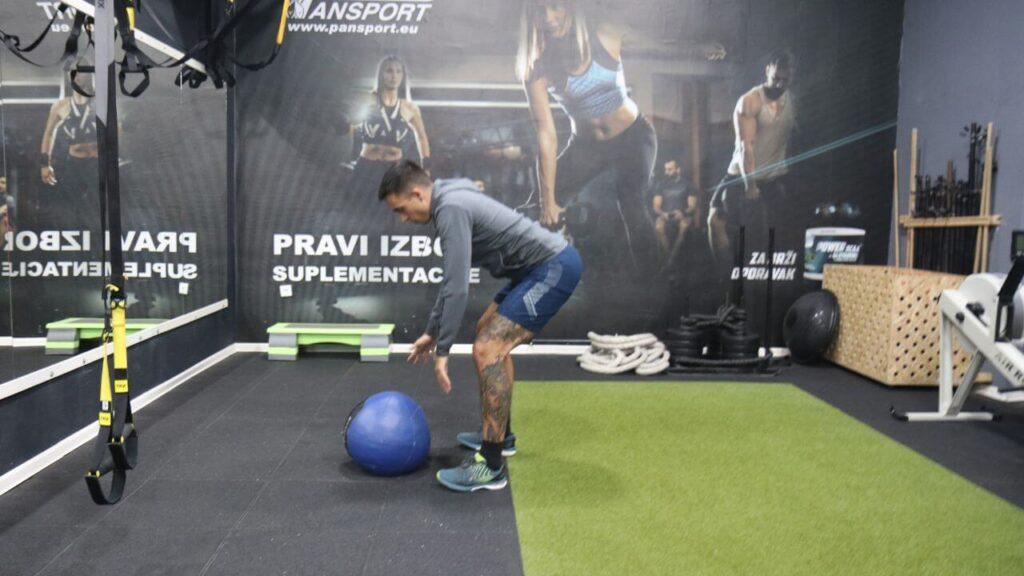
How to Perform a Ball Slam
- Start with holding the medicine ball in both hands at chest height while standing with your feet shoulder-width apart.
- Lift the medicine ball up and away from your body by engaging your core and raising your arms above.
- When you’ve reached the peak of the movement, smack the ball forcefully against the surface in front of you.
- When the ball rebounds, grab it and bring it back up to your chest.
9. Dumbbell Bench Press
Dumbbell bench press is a popular upper-body exercise that emphasizes the chest, shoulders, and triceps and belongs to the horizontal push movement pattern.
A weight bench whose angle you may change to target different sections of the chest muscles is required for the exercise, along with a set of dumbbells.
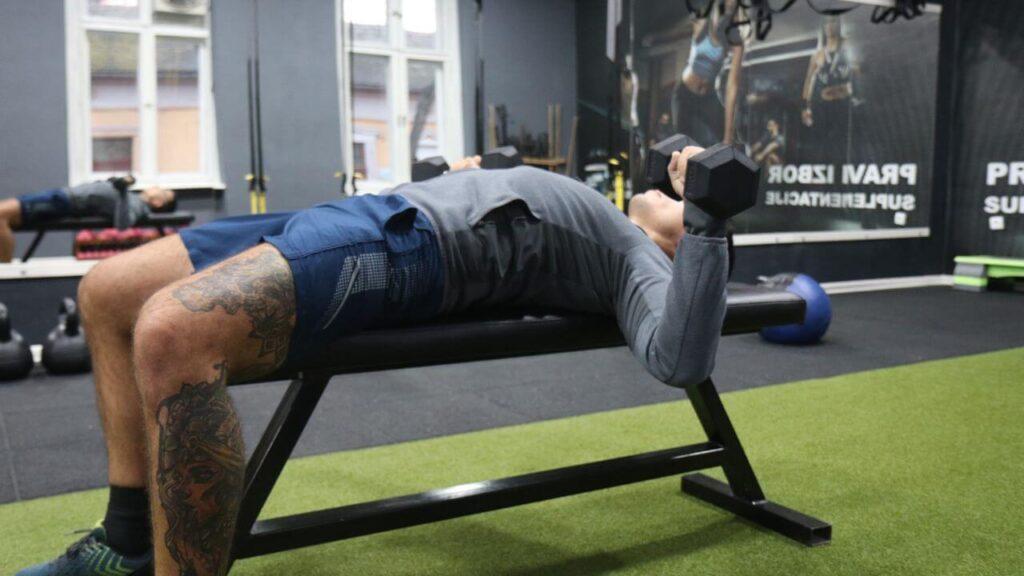
How to Perform a Dumbbell Bench Press
- Begin by reclining back on a weight bench or stability ball with a dumbbell in each hand at chest level.
- Keep your elbows slightly bent and your hands facing front while pressing the dumbbells up toward the sky while engaging your core.
- Keeping control during the exercise, lower the dumbbells back down to chest height, and repeat the movement.
10. Dips
Dips are a fantastic upper-body exercise that works the triceps, chest, and shoulders.
This exercise is part of the vertical push movement pattern and includes pushing your body weight up and down using parallel bars or dip bars.
The use of a dip machine or the addition of weight can both increase the difficulty of the workout when performing dips, making it a great addition to functional training upper body routines.
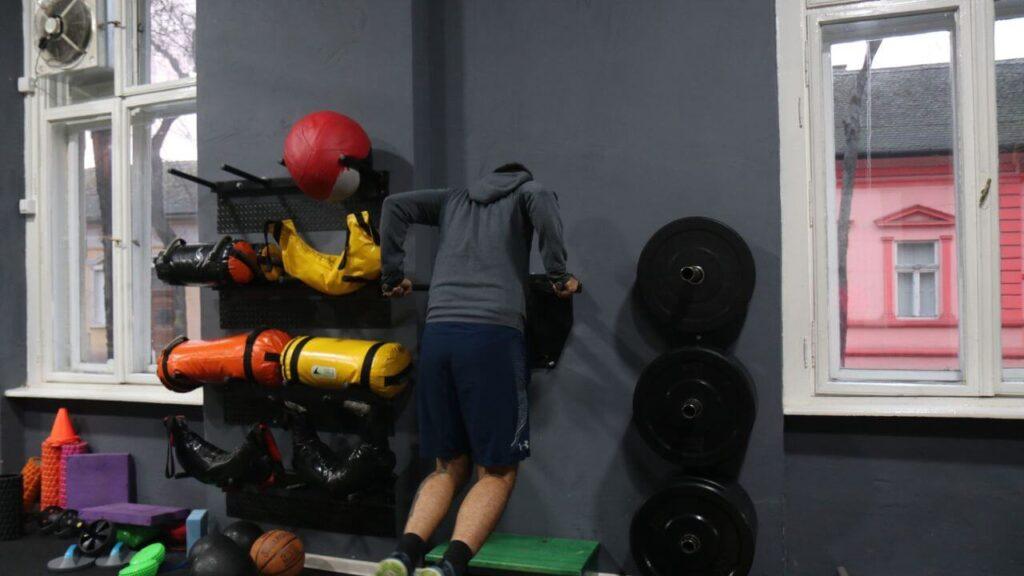
How to Perform Dips
- Starting from a standing position, grasp the parallel or dip bars with your palms facing down.
- Cross your feet behind you while raising your torso off the ground with straightened arms.
- Bend your arms while maintaining your elbows close to your body as you gradually lower your torso.
- Pull your body down until your arms are at a 90-degree angle, then push yourself back up to the starting position.
Expert Shares the Best Science-Based Upper Body Workout for Growth
In a YouTube video, Jeremy Either, NASM certified personal trainer, shares his approach to programming upper body workout for maximal muscle growth:
“As for the best exercises to include in your upper body workouts, a good way to set it up is by sticking to the following guideline: Horizontal push (e.g., dumbbell press), horizontal pull (e.g.barbell row), vertical push (e.g., shoulder press), vertical pull (e.g., pull-ups). Choosing your exercise in this fashion ensures that your upper body muscles are worked in a balanced manner, which helps prevent muscle imbalances from developing and helps target all of the upper body musculature.”
The Benefits of Fascia Massage Tools for Functional Upper Body Strength and Hypertrophy Development
Incorporating fascia massage tools into your functional upper body training routine can significantly enhance your strength and hypertrophy development. Fascia, the connective tissue surrounding your muscles, plays a crucial role in muscle recovery, flexibility, and overall performance.
When this tissue becomes tight or knotted, it can:
- Limit your range of motion
- Reduce muscle efficiency
- Increase the risk of injury
Improved Muscle Recovery
Fascia massage tools, such as foam rollers, massage balls, and percussive devices, help alleviate muscle soreness and speed up recovery by breaking down adhesions and promoting blood flow to the affected areas. By using these tools after your upper body workouts, you can reduce muscle tightness, enhance recovery, and ensure that your muscles are ready for the next training session. For a range of high-quality fascia massage tools, check out KOAPRO.
Enhanced Flexibility and Range of Motion
Regular use of fascia massage tools helps to lengthen the fascia, improving your overall flexibility and range of motion. This increased flexibility allows you to perform functional upper body exercises with better form and a greater range of movement, which can lead to more effective workouts and better results in terms of strength and hypertrophy.
Increased Hypertrophy Potential
By improving muscle recovery and flexibility, fascia massage tools indirectly support hypertrophy (muscle growth). When your muscles recover faster and move more freely, you can train more intensely and with a greater focus on muscle contraction. This enhanced training capability contributes to better muscle growth over time.
Injury Prevention
Incorporating fascia massage into your routine can also play a critical role in injury prevention. Tight fascia can lead to imbalances and compensatory movement patterns that increase the risk of injury. Regular use of fascia massage tools helps to keep the fascia supple, reducing the likelihood of injury during intense functional upper-body workouts.
FAQs
How Do You Build Functional Upper Body Strength?
You build functional upper body strength by using a planned, all-encompassing strategy that emphasizes compound exercises, stability training, and good form.
What Are Functional Strength Exercises?
Functional strength exercises are ones that concentrate on enhancing your body’s capacity to carry out daily tasks with comfort, effectiveness, and no discomfort or damage. These workouts involve motions that imitate daily tasks including lifting, bending, pushing, pulling, and rotating to target several muscle groups.
Does Functional Training Make You Lean?
Yes, functional training makes you lean by concurrently working various muscle groups and emphasizing compound motions. These exercises promote the development of lean muscle mass while also reducing body fat, resulting in a more toned and defined physique [2].
Our Recommended Functional Upper Body Equipment
Amazon Basics Hex Dumbbell

- Durable cast iron
- Non-slip grip
- Available in multiple sizes
What Is the Best Equipment for Building Functional Upper Body Strength?
The best equipment for building functional upper body strength is free weights.
There are many examples of free weights, and some include barbells, dumbbells, kettlebells, and medicine balls. These are essential for upper body functional workout.
If you want to build a more functional and stronger upper body, read our guide on the best functional training equipment for 2026 to get you started.
Let me know which functional upper body exercise is your favorite and why.
Start Building Your Dream Body Today
Ready to elevate your fitness game without falling into the trap of dull, repetitive routines that just don’t deliver? Imagine sculpting your ideal physique and boosting your health, all while still enjoying life’s pleasures, like those irresistible weekend getaways and your aunt’s legendary cheesecake. With our online fitness and nutrition coaching service, you don’t have to compromise. Dive into a personalized fitness journey that blends perfectly with your lifestyle, not against it. Book your completely free discovery consultation today, and take the first step towards a transformation that doesn’t require giving up the joys of life.

“I was skeptical about online fitness coaching, but Functional Body Savage completely changed my perspective. Vanja and Radomir’s personalized approach and attention to detail have helped me achieve goals I never thought possible. I’m stronger, more confident, and grateful for their guidance.”
Emily Thompson, San Francisco, CA
Learn More About Our Online Coaching ServiceReferences:
- https://rmdopen.bmj.com/content/6/1/e001141
- https://www.frontiersin.org/articles/10.3389/fphys.2021.738878/full

